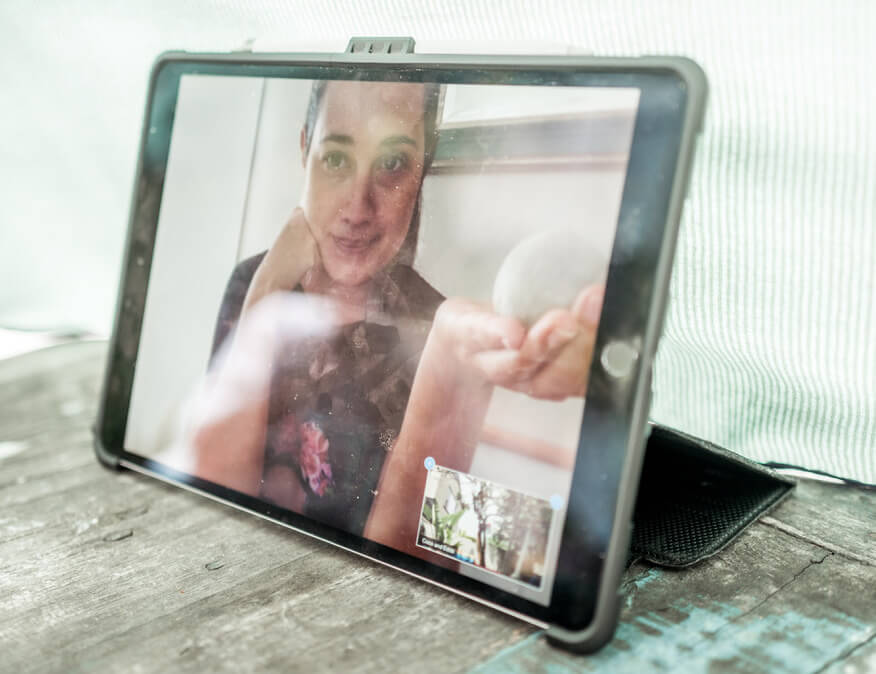
Whether teaching kids robotics, pottery or reading and math skills, some summer programs are doing what they can to provide families with a camp-like experience — even if that means going virtual.
Most are hoping their offerings are enough to keep their businesses afloat during a challenging economy. In the instances we found, the owners — all women — have made major adjustments to ensure safety for both their staff and young charges.
The STEM Problem Solver
Laura Hart, founder of Robofun, a STEM camp in New York City, is highly attuned to the needs of parents.
As a single mom herself, Hart is making sure that her camp follows every precaution she would want if she were sending her own son. She made a last-minute decision in mid-July — her camp runs through Labor Day weekend — to offer an in-person program to 12 students. She normally hosts about 45 kids.
“I’m viewing this as much as a mom as a business owner,” Hart said. “I want parents to have a place to drop off their kids and be safe, and I’m very cautious and protective of my staff.”
At the physical location in upper Manhattan, children from Pre-K to 6th grade will learn robotics and circuitry through the popular video game Minecraft using their own individual plastic containers of materials. There will be rugs on the floor to keep them 6 feet apart, and just three staff members in the room at a time.
She is also growing her online program, and she started enrolling clients in late March for a couple of weeks for free so she could experiment.
“We investigated another robotics platform we could send home,” said Hart, who has a master’s degree from Harvard and worked at the MIT Media Lab. “We started classes online and said, ‘This is going to be our summer.’”
[Related: How to Manage a Small Business During the Coronavirus Crisis]
By June 15, remote summer camp was officially open for business and Hart was able to hire back eight of her nine full-time staff members and roughly 20 of her 60 part-time staffers. And she has reduced her fee for classes, which typically runs from $175 to $409 a week.
“I’ve sort of just thrown up my hands,” she said. “My goal is to stay a business and keep as many employees as I can. I have taken a salary cut.”
Still, she added, “I feel really good. As an entrepreneur, I’m not going to give up.”
The Screen Saver
For Elsie Koo, owner of JEI Learning Center in Marlboro Township, New Jersey, running a camp is about striking the right balance between screen time and actual hands-on fun.
In the mornings, campers in grades 1-8 submit to online “academic hours,” boosting skills in reading, writing and math, and then in the afternoons they have activities such as trivia and scavenger hunts. Koo also partnered with a local STEM company called Built By Me, which offers podcasting, photography, 3D printing and game design lessons.
Feedback from parents has been “mostly positive,” said Koo, who bought the Marlboro center, part of a franchise, a decade ago. “There are some parents who have concerns with too much screen time. One parent asked if we can give kids some breaks.”
While parents were praying to send their kids off to physical camp, that hasn’t been the case for many.
“Parents want some structure, but a lot of parents actually signed up late because they were hoping the camp would open in-person,” Koo said. “But then, as we got closer to summer starting and camps weren’t opening, they all rushed to sign up.”
Even though the program takes place on Zoom, Koo still decided to reduce class size so there is a 4 to 1 student-teacher ratio. She has about 30 kids each week. A whole day usually runs about $400 a week, and she lowered the cost by $100.
“If you think about it, my costs are higher because, before, I could take 12 kids in a class and now I’m only taking five,” she said. “But the good thing is I can take a break in the afternoons. Even though I’m making less money, I’m happier because I get to spend my afternoons more free.”
The Pottery Pivoter

Another camp owner trying to embrace change is Lina Alvarez, who founded Good Dirt LA, a pottery studio in Los Angeles, 5 years ago.
She used to be able to accommodate up to 16 students ages 6 to 12 in her summer camp, but with an 800-square-foot studio, she can only host three now. Others who sign up learn how to make pinch pots and hanging bells online, and then have contactless drop-off and pick-up so their creations can be fired at the studio.
Still, Alvarez is anxious about how she will stay in business.
“There is not a demand for classes,” she said. “I was worried about how to make the rent when we were closed, now it’s how to do it while we’re open.”
[Related: How to Offer a Summer Internship Program, Paid or Unpaid]
She is currently exploring other revenue streams, including remote birthday parties and offering clients “creative time” — hours they can purchase to use the studio for their own projects.
“For three hours they pay $50 and come and use the studio,” Alvarez said, adding that the feedback was “overwhelming.”
“They said they really needed a place to just come and do something different,” she continued. “Even if they get to socialize with one other person, it’s nice.”
A mother-daughter duo sign up each week to make their own pottery, as well as an elderly couple who book three hours together every Sunday.
“It’s so therapeutic to come here and create and be away from everything,” Alvarez said. “I’m working a lot to keep the business open, but it’s nice to be able to share the space to be creative.”

